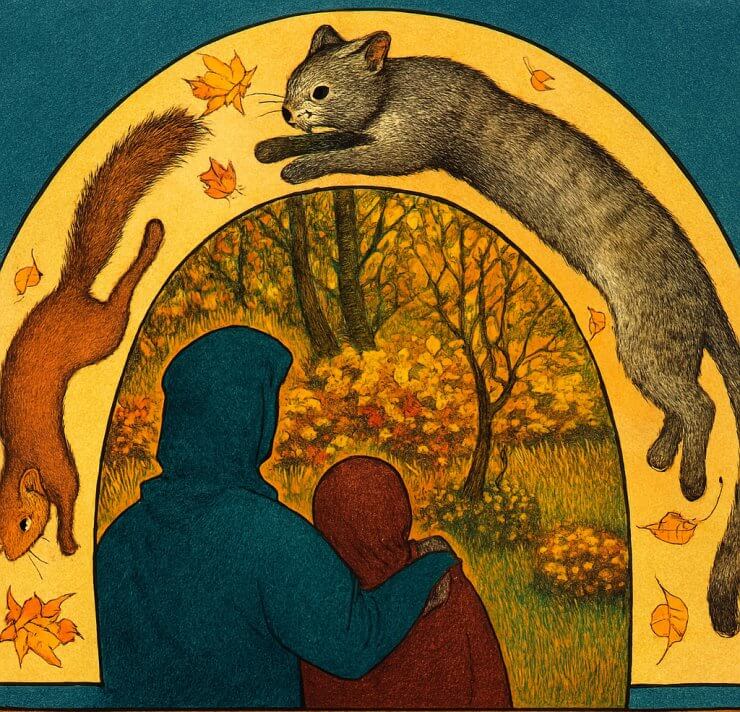Read by Matilda Longbottom
One year some time back, when all of us were younger, Chester, our cross-eyed cat, killed a chipmunk. This would be all in a day’s work for the average country cat, but Chester is a notably backward and incompetent (though pleasant-natured) creature; his unexpected success, chipmunk-wise, was obviously a stroke of pure dumb luck, the sort of left-handed feat one would expect of a feline Forrest Gump. He apparently nabbed the (possibly already unconscious) chipmunk in the blackberry thicket behind the barn, well out of sight of the house. This little tragedy thus might well have painlessly passed, but Chester—astonished by his unprecedented ingenuity—was unable to resist showing off. Triumphant, he galloped out of the underbrush, brandishing his chipmunk, and deposited the remains on the second step of the back porch. There cat and catch were intercepted by Caleb, then seven, our youngest son.
Dealing with the hard facts of life is one of the least enviable of parental tasks. Sooner or later, no matter how cherished and protected our children, they all run up against life in the raw: the unfairness of society, the meannesses of persons to persons, the cruelties of nature. Usually, it starts small. Somebody calls them nasty names at the playground. A best friend decides not to be. A beloved old dog dies. And, there you sit with a sobbing child in your lap, telling him that all will be better, when you know perfectly well that there’s more of the same in store.
There’s no wholly satisfying explanation for why a well-fed household pet unjustifiably goes out and slaughters innocent chipmunks. I tried. Any chipmunk falling victim to Chester, I feebly pointed out, was doubtless a terminally ill and/or Methuselan chipmunk, an animal whose number was about up anyway—but Caleb found that poor comfort; neither was he soothed by talk of nature’s way, hunting instincts, or population control.
Eventually Chester, still heartlessly pleased with himself, was banished to an upstairs bedroom, and the chipmunk, tenderly wrapped in a blue bandanna handkerchief, was ceremoniously buried beneath the pine tree in the backyard, its grave marked with a vast cairn of stones hauled from the pasture wall. Caleb was helped in this dolorous endeavor by his older brothers, who—having survived the demise of two hamsters, four goldfish, all 27 inhabitants of an ant farm, and a black cat named Martha are somewhat more inured to the brevity of life on earth.

Which is more than I can say. The children have the advantage of me; they’re still insulated by distance and time. Death, in the grand sense, is for them still safely far from home: pets sometimes die, and anonymous people in the newspapers, unremembered great-aunts, and long ago never-seen grandfathers. Nothing too frightening or too close yet; death for our children remains a bad dream, a specter that can be banished by a drink of water and a light left on in the hall. So far, we’ve been lucky.
Mortality is on my mind this time of year. The first hard frosts do in the garden: the last few forgotten tomatoes turn black; the lettuce is long over; the cucumber vines are withered straw. The boys have picked the pumpkins, which sit glumly next to the kitchen door, waiting for Halloween. The largest of the lot, I notice, has a paper tag tied to its stem reading CALEB’S PUMPKIN, a staked claim that is bound to cause trouble later. Fall is flaringly spectacular here in Vermont; October, the color of bonfires, is always my favorite month of the year. Still, it’s a wrench to see the green go. We spend a chilly afternoon dismally tearing up the remnants of beans, broccoli, and marigolds and throwing them on the compost pile. From the pile end of the garden—in sight of the chipmunk’s Stonehenge-sized grave—the view is gloomy. Life seems dismayingly fragile, and it looks like a long time until next Spring.
It’s the transition periods that do this to us. The turnover points in the year’s cycle can’t help but make us glumly reflect upon our own. On the other hand, cycle itself is an optimistic word. A cycle is a circle, an endlessly revolving wheel, a never-ending story. What goes around, in one way or another, eventually comes back around. Life in the long run, I finally tell Caleb, is a matter of taking turns. Chipmunks die to make room for younger chipmunks. This year’s garden, plowed under, makes room for next year’s garden.
We grow older so that our children can have their turn to grow up. We die so that our great-grandchildren can have their turn to be born. ❖


 Previous
Previous


